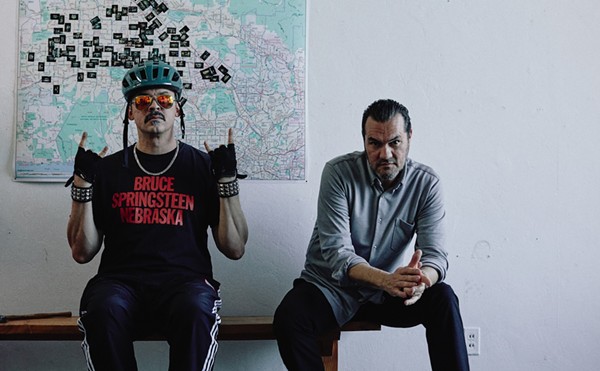Imagine it's still mid-August and you're trying to do what every other warm-blooded animal is trying to do -- escape the heat. Being a human animal, and an American one at that, you go down to your suburban googleplex to catch the latest escapist product from Hollywood, which at this moment happens to be Vin Diesel's XXX. As the super-macho flick starts to roll, you slowly notice that a trio of women in the audience is snickering far louder than you dare. Glancing over, you practically choke on your Twizzler -- it's the three members of Sleater-Kinney.
"There just weren't a lot of movies to go see on that particular day," admits drummer Janet Weiss in a phone interview from her home in Portland, Oregon. It's a hot August afternoon, just before the band will commence its latest national tour, and a touch of embarrassment creeps into Weiss's voice. "I actually didn't hate it as much as everyone else did -- and I really hate bad movies. For some reason, I just thought it was so comical."
Weiss's need to rationalize her selection of summer escapism makes sense. Not only have these women always countered the idea of rote corporate entertainment with their bracing, angular music and militantly feminist lyrics, but they've taken that oppositional stance further than just about any other contemporary underground rockers. As rock-critic guru Greil Marcus wrote in Time magazine last year, "With Sleater-Kinney, the edge is never off."
In a way, that's exactly why they sought the relief of a cool theater (and dumb movie) -- or, for that matter, why the women make a point of going out once a week to play trivia games. "It really helps us to get along, to have other things to draw on besides the band," explains Weiss. "Really, the core of the band is the friendship and the respect between the three of us. And if that is at all challenged or compromised, things become tense and difficult. There have been times when the only time we spent together was doing interviews or being on tour, which can be really stressful. You know, we've gone to counseling. We've worked through the problems that break most bands up. So things are a lot easier now."
Before Weiss joined the lineup, however, the band was practically designed to feed off the relationship between the two founders, singer-songwriter-guitarists Corin Tucker and Carrie Brownstein. Like other lesbian-identified punk rockers of the mid-'90s -- Tribe 8, Team Dresch -- Tucker and Brownstein worked out their romantic as well as their artistic attachments in song, declaring their sexual union as proudly as their radical politics. But as Weiss notes offhandedly, "That was ages ago. We've got all kinds of other things to deal with now."
Sleater-Kinney's recently released sixth album, One Beat (Kill Rock Stars), tackles some of those "other things" with the same edge as ever -- and a newly enhanced musical richness. In part, as Weiss explains with a laugh, the band just had more tracks to work with. But that doesn't explain how the women use them without muting their trademark intertwined vocals and guitar lines, which still chase each other like snakes slithering after scampering mice. Now, however, the songs connect to musical history beyond the Lilliput/X-Ray Spex/ Gang of Four tradition that originally gave the trio its yin-yang combo of clarion vocals and thin, rigid guitar lines exploding into dense thickets of strummed chords and layered harmonies. Brownstein's "Step Aside," for one, insists that we "shake a tail feather for peace and love" like a lost Wilson Pickett single. "Light Rail Coyote" breaks into an extended double-time break, only to climax with a coda echoing Al Green's "Take Me to the River." And "Oxygen" is just one of several numbers that demonstrate a theatrical abandon in the vocals -- a combination of faux-new-wave cyborg-singing and Valley Girl hissy fit -- that ensures the band will remain on the fringe, no matter how much mastery it demonstrates over mainstream pop-music history.
"I'm not exactly sure why Carrie sings 'oxy-geh-EH-ehn,'" admits Weiss. "She really just sang it that way in the studio; she'd never sung it that way before. It was just spontaneous. We were like 'That's great! That's so good!' I think we egg each other on, sort of to push things -- especially on this record. When Corin did her vocals for 'One Beat,' we just were cheering. You know, we wanted to take risks. We went into the writing and the recording of this record thinking, 'It's our sixth record. We don't need to rehash everything we've done already. Let's do some new, different things.'"
That newfound daring is a result of the time the band took off after its last album, 2000's All Hands on the Bad One. "We had an entire year to sort of clear the palette and start from a fresh place. We weren't touring, we weren't playing music, we weren't looked at as Sleater-Kinney for an entire year. And I think, because of that, we were in a really personal space when we started working on the record."
Over the course of last year, Brownstein relocated from Olympia, Washington, to join Tucker and Weiss in Portland (and begin those weekly trivia games). Just as significantly, Tucker had her first child, Marshall, who is now 17 months old and will join the band on about half the tour dates. And, of course, in the same period, their quiet downtime was shattered when they turned on the TV one morning to "watch the world explode in flames," as Tucker sings on "Far Away."
It would be easy, in fact, to claim that September 11 reenergized the band. After all, the tragedy frames the disc, from the philosophical musings of the title track, which imagine a wager for a better world, to Tucker's closing "Sympathy," a tribute to anyone hearing news that leaves them "naked in the face of death and life." But in fact, as Weiss makes clear, Sleater-Kinney is rising above, just by embracing the breadth of life at this moment -- which means protesting the government's civil-rights crackdown ("Combat Rock") or exploring the history of their city ("Light Rail Coyote") as much as mourning the losses at Ground Zero.
"I think last year was a really dark year, for us personally and for humanity. And every year is a dark year for humanity, it seems like. But all of a sudden, we were forced to think about it a little bit more. Specifically, I think I've heard [Corin] say that she thought it was really important for there to be a song reacting to September 11 from the point of view of a housewife and a mother. I mean, it's like knowing that this thing has become a part of you, and that if you're going to write honest, personal music -- which is kind of our --you know, it's what we do -- then it has to filter its way into the music. You can't really push it away."
To put it another way: When the lights come up in the cool theater, we all have to make our way back into the heat.













